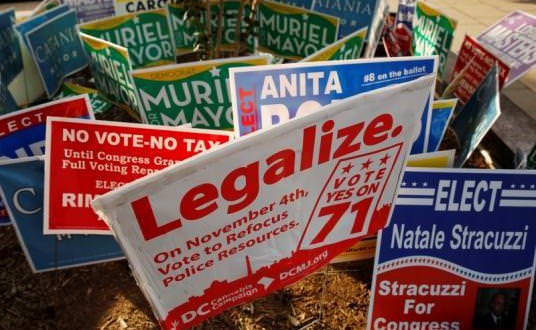Marijuana legalization won in Alaska, DC, and Oregon, but when can you smoke pot legally?
Oregon will join Colorado and Washington state, where voters approved the recreational use of pot two years ago. And the District of Columbia is on the same path unless Congress, which has review power, blocks the move.
Alaska also had a marijuana-legalization measure on its ballot yesterday.
Other volatile issues on state ballots included gambling and abortion. Two competing measures in Washington state gave voters a choice on whether to expand background checks for gun sales.
The District of Columbia’s marijuana measure does not provide for the legal sale of marijuana, leaving that matter up to the D.C. Council. That’s different from the measures in Oregon and Alaska, which would follow the example of Colorado and Washington state in setting up systems for regulating and taxing retail sales of marijuana.
In Florida, a measure that would have allowed marijuana use for medical reasons fell short of the 60 percent approval to pass; near-complete returns showed it getting about 57 percent of the vote. Twenty-three states allow medical marijuana.
Some of the other questions before voters yesterday:
Abortion measures
In Colorado and North Dakota, voters rejected measures that opponents feared could lead to bans on abortion.
The Colorado proposal would have added “unborn human beings” to the state’s criminal code. It was the third measure on Colorado ballots in recent years seeking to grant “personhood” to the unborn.
North Dakota voters rejected an amendment that would have declared in the state constitution “ the inalienable right to life of every human being at every stage of development must be recognized and protected.”
In Tennessee, voters approved a measure that will give state legislators more power to regulate abortion. Opponents fear it will lead to tough new laws that would jeopardize women’s access to abortions.
Gambling showdown
In Massachusetts, voters passed up a chance to say “No” to casinos. They rejected a measure that would have repealed a 2011 law authorizing development of a slots parlor and up to three resort casinos. There are none in the state now, but casino plans have been approved for three cities across the state.
A victory for the anti-casino forces would have marked the first time — at least since the modern era of U.S. gambling began in 1931 — that a state reversed a major legislative decision to expand gambling.
Minimum wage
Voters in Arkansas and Nebraska approved increases in their states’ minimum wages. In Arkansas, it will rise from $6.25 an hour to $8.50 by 2017, in Nebraska from $7.25 to $9. Two other states — Alaska and South Dakota — also were voting yesterday on minimum wage increases.
Sick time
Massachusetts voters approved a measure that supporters say will establish the nation’s strongest requirement for providing paid sick time to workers. Workers will be able to accrue up to 40 hours of paid sick time in a given year, earning one hour for every 30 hours worked. Companies with 10 or fewer employees would be exempt.
Teachers take stands
In Missouri, voters defeated a measure that would have tied teachers’ jobs and salaries to the performance of their students.
Teachers unions were supporting an initiative in Washington state that would reduce class size and increase staffing support in grades K-12. State financial experts believe the measure would eventually cost the state about $2 billion a year to pay for thousands more teachers and other school staff members.
Food fight
Colorado voters rejected a measure that would have required labeling of certain genetically modified foods. The proposal would have applied to raw and packaged foods produced entirely or partially by genetic engineering, but not apply to food served in restaurants.
A similar measure was on the ballot in Oregon.
Gun sales
Washington state had two competing gun-related measures. One seeks background checks for all gun sales and transfers, including private transactions. The other would prevent any such expansion covering purchases from private sellers.
Six states require universal background checks for all sales and transfers of firearms. Washington’s law, like federal law, requires checks for sales or transfers by licensed dealers but not for purchases from private sellers.
Agencies/Canadajournal

 Canada Journal – News of the World Articles and videos to bring you the biggest Canadian news stories from across the country every day
Canada Journal – News of the World Articles and videos to bring you the biggest Canadian news stories from across the country every day

